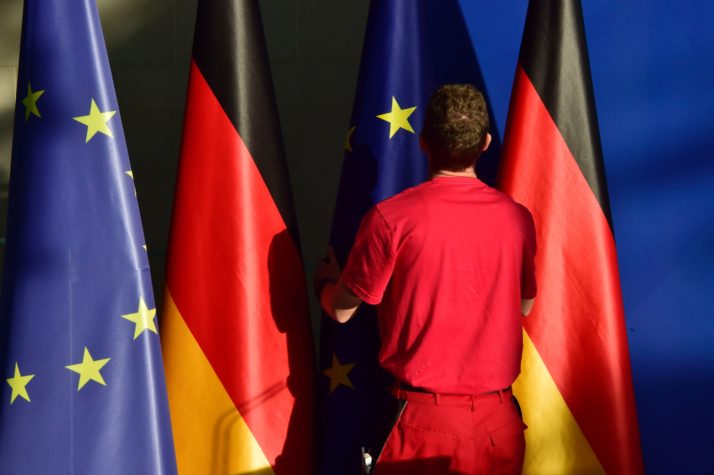
German prosecutors said Wednesday they are investigating three people on suspicion of espionage and that investigators carried out searches in Brussels, Berlin and the German regional states of Bavaria and Baden-Württemberg | John MacDougall/AFP via Getty Images
Probe exposes concerns about EU’s ability to protect sensitive information.
A German former diplomat suspected of spying for China was recalled from his post as EU ambassador to South Korea after his security clearance was withdrawn.
German prosecutors said Wednesday they are investigating three people on suspicion of espionage and that investigators carried out searches in Brussels, Berlin and the German regional states of Bavaria and Baden-Württemberg. The three suspects work for lobbying firms and are suspected of spying for China, German media reported. One of them is a former senior EU diplomat, according to officials.
The case has sent shockwaves through Brussels and raised concerns about Chinese espionage and the EU’s ability to guard sensitive information.
Officials familiar with the case have confirmed key details of the investigation to POLITICO, including the identity of the former diplomat. But German authorities have not named him, nor have they charged anyone or made any arrests as part of the investigation so far. The ex-diplomat’s employer has stated that he vehemently denies the allegations against him.
Asked about the former diplomat, a spokesperson for the European External Action Service (EEAS), the EU’s diplomatic corps, said: „The person you refer to is a former EEAS staff member, who retired in 2017. He was Head of the EU Delegation to the Republic of Korea as of September 2015. His national security authority withdrew his security clearance after his posting. He was subsequently recalled to Headquarters in 2016 upon the notification of the withdrawal by the competent authority.“
„The reason why his national security authority withdrew his security clearance is a matter for the national security authority.“
Two diplomats and a European Commission official, speaking on condition of anonymity, said the diplomat was recalled from his posting due to links to China, although they gave differing accounts of the nature of those links.
The EEAS spokesperson said: „The reason why his national security authority withdrew his security clearance is a matter for the national security authority. They are responsible for conducting investigations leading to the granting — but also possible withdrawal — of security clearances and they do not have to provide the EU institutions with reasons for doing so.“
The investigation into the ex-diplomat has brought to the fore long-standing concerns about the EU’s operational security. The “repercussions are enormous,” said a former intelligence official from an EU member state. The EU “has no operational counterintelligence.”
Diplomats said one problem highlighted by the case was that EU institutions rely on national authorities to provide security clearances for their diplomatic staff. As the EEAS spokesperson highlighted, those authorities are under no obligation to explain or justify their decisions to the EU.
“Diplomatic staff need security clearance for access to classified information,” said one diplomat. “There’s no EU body to do that. You get the necessary certificate from the national authorities and present it to the EU institution you’re working for.”
Source: politico.com
See more here: news365.stream






